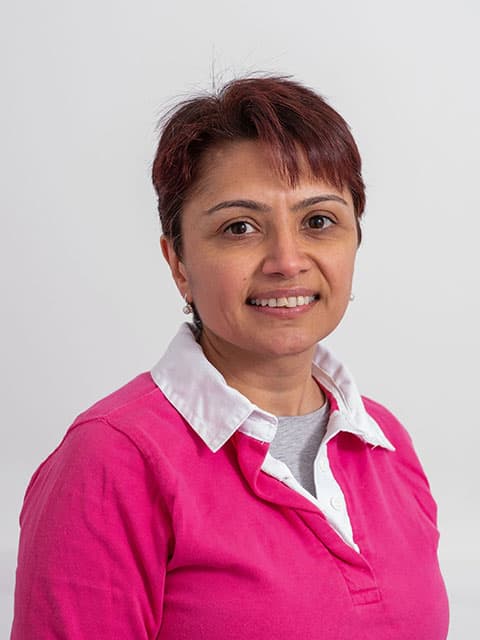Pooja grew up on the foothills of Mount Kenya. Now she is a long way from home but enjoying her new role as a Lecturer at Loughborough University. Her academic career started with a First class (Hons) MChem (Chemistry) degree from Coventry University which included an industrial placement at GlaxoSmithKline. She then went on to pursue a PhD at the University of Warwick with the late Prof. Mark Rodger. This was part funded by industry (Cabot Speciality Fluids) and by the Warwick Postgraduate Scholarship. The project involved Computational and Experimental Studies of Formate Brines. These are dense but viscose salt brines used in oil drilling applications.
In 2005, Pooja moved to the Dept. of Physics and Materials Science at Uppsala University, Sweden, working with Prof. Peter Oppeneer, Dr. Biplab Sanyal and Prof. Olle Eriksson on a FP7 project looking at diagnosing malaria using a magneto-optical technique which would be fast, efficient and reliable and most importantly non-invasive. After 3 ½ years she joined the University of Bath as an EPSRC Research Officer working with Prof. Saiful Islam. The projects involved computational studies of Energy Materials with applications in Sustainable Technologies such as Li Ion Batteries, Fuel Cells and Thin Film PV materials. Since then she has been Senior Research Fellow at the University of Huddersfield, before joining the team at Loughborough in 2015.
Research areas
My research focusses on computational studies of fundamental processes in complex materials at the atomic/quantum scale. This requires a good understanding of the structural, electronic, magnetic and transport properties which are crucial in identifying novel functional materials for sustainable energy and or catalytic applications. The nature of defects in inorganic solids as well as their effect on electronic and transport properties is also important in not only understanding the key structural/property relationships but also in the next phase of materials design with enhanced performance. In addition to this a sound understanding of nano-ionic properties can yield a wealth of materials with significant technological impact.
The computational methods range from atomistic potentials-based methods, where the forces are dominated by the long range electrostatic interactions, but also includes short range, van der Waals attractions, electron – electron repulsions and polarisability, to density functional theory (DFT) at varying levels of theory. Molecular dynamics is also used to study the transport properties as a function of time and temperature.
Further to this expansion towards more sophisticated time dependent density functional theory and embedded cluster methods is being pursued.
Current collaborations include:
- Knowledge Transfer Partnership with Echion Technologies, Cambridge 2021.
- Computational modelling of CdTe Thin Films: Prof. Mike Walls, Prof. Roger Smith, Prof. Stuart Irvine, Dr. Kartopu Giray, Prof. Kurt Barth and Prof. Sampath and Dr. Biplab Sanyal
- Design of high entropy alloys: Prof. Roger Smith and Dr. Andrew Duff, EPSRC
- Design of next generation fingerprint development reagents and metabolites: Dr. Roberto King, Dr. Paul Kelly, Dr. Stephen Bleay, Prof. Paul Thomas, Prof. Gary Eiceman and Prof. Ponandurai Ramasami:
- Practical and Robust Li Air Batteries: Prof. Laurence Hardwick, Dr. Enrico Pertrucco, Dr. James Cookson, Innovate-UK, TS/N00941X/1 and TS/R002312/1
- Computational studies of solid state Lithium ion battery materials: Prof. Serena Corr, Dr. Eddie Cussen and others, EPSRC
- Solid state Li ion battery materials and Fuel cell materials: Prof. Peter Slater, Prof. Frank Tietz, Dr. Enkhe Dashjav and Dr. Jamieson Christie
Previous Collaborations Include:
- Prof. Saiful Islam - University of Bath
- Prof. Olle Eriksson - Uppsala University
- Prof. Peter Openeer - Uppsala University
- Prof. Peter Bruce - Oxford Materials
- Prof. Clare Grey - University of Cambridge
- Prof. Heiko Wende - University of Duisburg - Essen
- Elected RSC Inclusion and Diversity committee, (07/2021 – 07/2024)
- EPSRC Strategic Advisory Team member, e-infrastructure (01/2021 – 01/2024)
- Appointed Member of the Dalton Division Council, PACN, RSC (09/2020 – 09/2023; 09/2017 – 09/2020)
- EPSRC Panel member, 2015, 2020, 2021
- PhD external examiner for a number of UK and EU Universities.
- Elected board member, Science, Education and Industry Board, RSC (2015 – 2018)
- Executive Committee member and Publication Officer, RSC, Solid-State Group (2014 – 2017)
